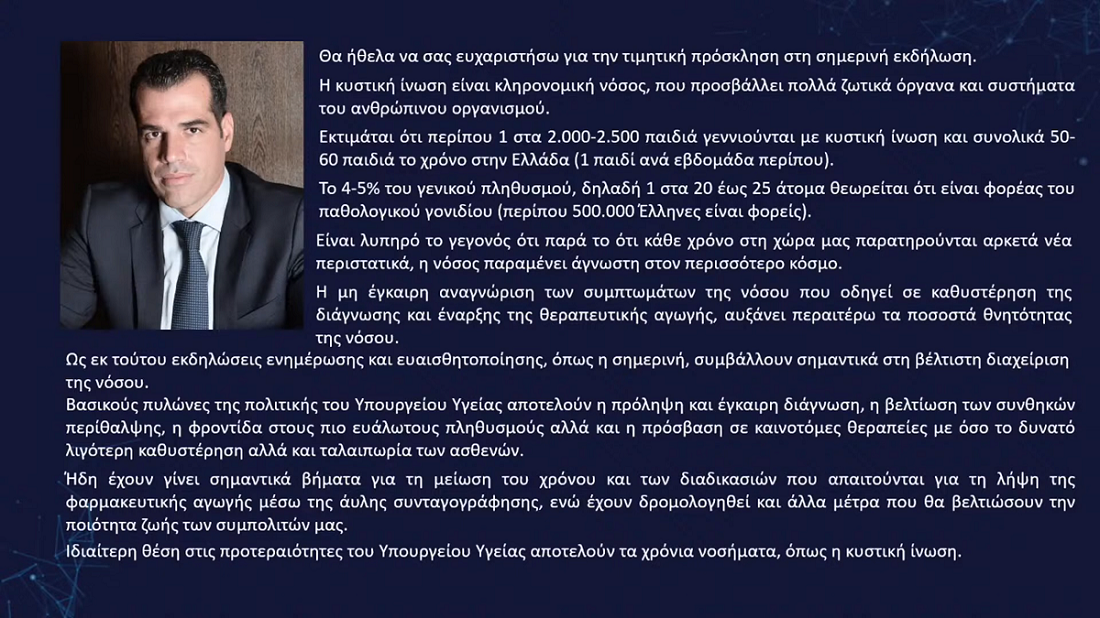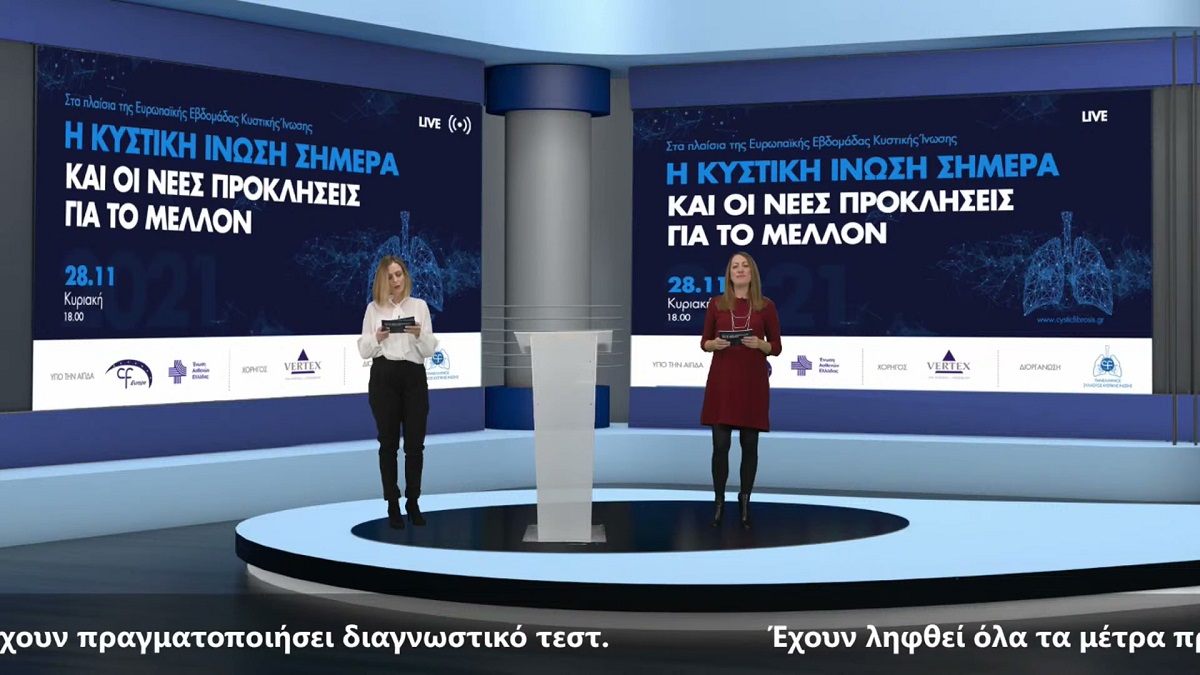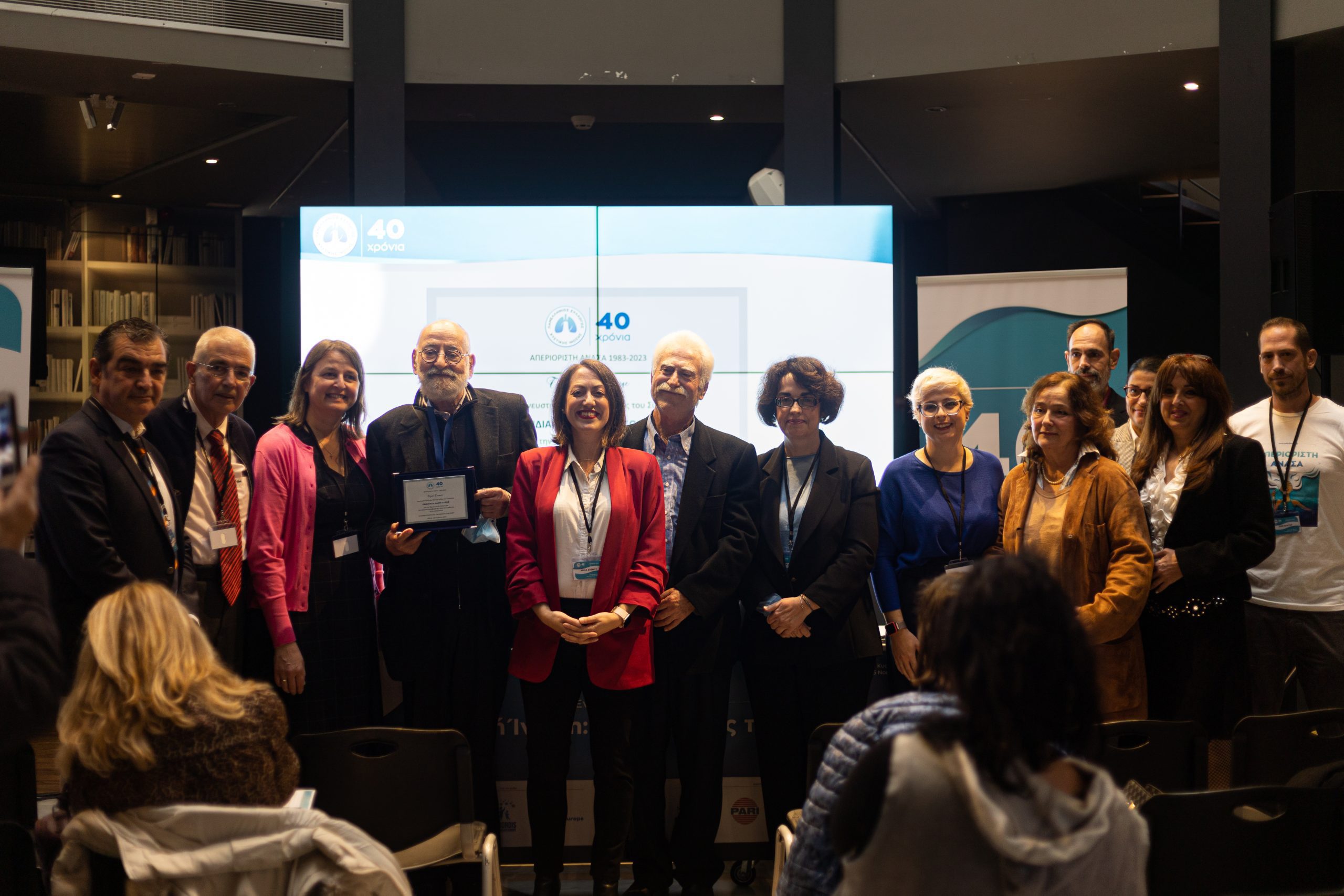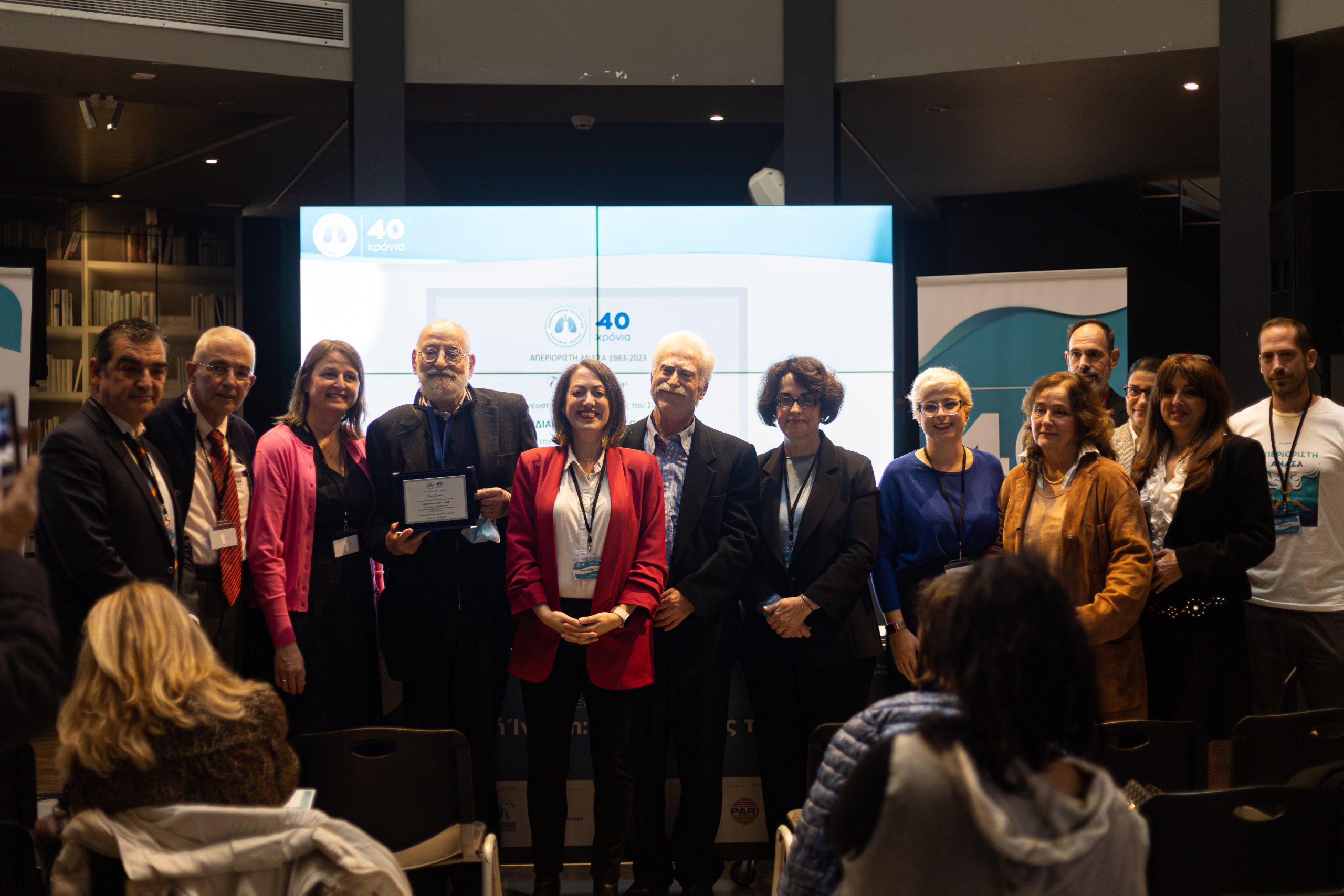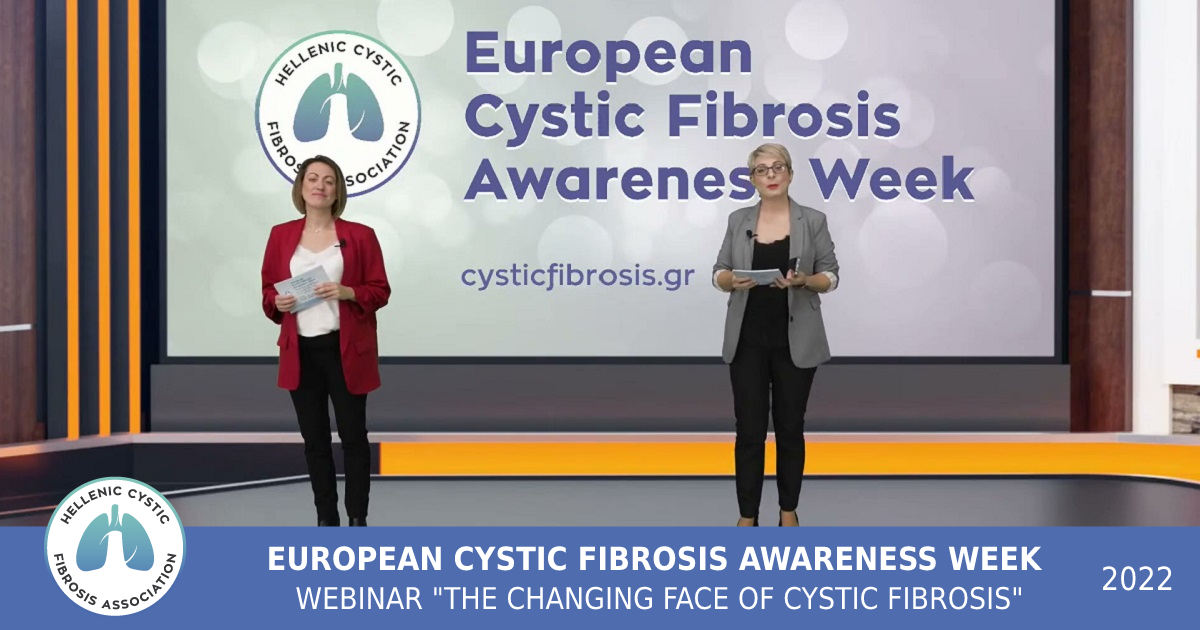1/12/2021
New Era for Cystic Fibrosis patients after the access to a revolutionary treatment that “freezes” the disease
On Sunday 28 November, the online conference of the Hellenic Cystic Fibrosis Association on “Cystic Fibrosis today & the new challenges for the future” was completed with great success and great interest. The event was attended by more than 480 people, including patients, their family members and representatives of the medical community, while several patients were given the opportunity to submit their questions, which were answered during the proceedings. The event was moderated by the President of the Hellenic Cystic Fibrosis Association, Ms. Anna Spinou and the General Secretary, Ms. Konstantina Giannaki.
The Minister of Health, Mr. Athanasios Plevris, in his address, stated that chronic diseases such as Cystic Fibrosis have a special place in the priorities of the Ministry of Health, while he pledged to be a helper and active supporter in every effort aimed at improving the course of the disease and the quality of life of patients with Cystic Fibrosis. He made a special reference to the National Registry of Cystic Fibrosis (CF) Patients, which has been operating since 2020 and has so far registered 95% of CF patients in Greece. As Mr. Plevris stated: “The ultimate goal of the Ministry of Health is an approach focused on the needs of people affected by Cystic Fibrosis, through access to high quality innovative treatments but also by providing services aimed at improving the quality of life, so that each patient lives, as far as possible, free from the symptoms of the disease but also becomes able to participate as much as possible in their daily social and professional activities”.
The latest information on Cystic Fibrosis in children in the post-covid era was presented by Mrs Elpida Hadjiagorou, Associate Professor of Pediatrics – Pediatric Pulmonology, Aristotle University of Thessaloniki, Head of the CF Unit at the Hippocratic Hospital of Thessaloniki and Head of the scientific committee of the European Registry of CF patients in Greece. In her talk she discussed the efficacy of different CFTR modifier therapies and the prospects for children following single, double and triple combination therapy. The benefits are multiple, but particularly significant benefit is obtained from the triple combination of CFTR modulators Kaftrio on respiratory function and BMI in children older than 12 years with CF and one or two F508del mutations, and the case of an infant with CF born to a mother with CF who received the triple combination of Kaftrio in pregnancy was presented, giving new data on modification of the disease itself in the case of starting treatment from infancy. Similarly, microbial morbidity appears to be frequently altered with CFTR modifiers, and a significant reduction in outbreaks is obtained. Ms Hatziagorou reported on the Telemedicine Programme at the CF Unit of the Hippocratio Hospital, which aims to improve respiratory function, compliance, physical activity and quality of life and to predict pulmonary exacerbations through symptom recording, home spirometry, oximetry, tele-exercise and tele-physiotherapy, involving 140 patients. The change in the care of CF patients during the pandemic was also reported. Data showed that 28.33% of patients reported exacerbation symptoms and received oral or intravenous antibiotics by telephone, and the impact of the pandemic on daily physical therapy and exercise was significant.
Mrs. Aikaterini Manika, Associate Professor of Pulmonology, Aristotle University of Thessaloniki, and head of the Adult CF Unit of the Papanicolaou Hospital of Thessaloniki, spoke about the challenges in the treatment of adult disease in the light of new therapies. She stressed that new therapies have changed the lives of CF patients, while CFTR modulators have changed the landscape in terms of disease management and especially the triple combination of Kaftrio will be a leap forward, both in improving patients’ quality of life and their survival. The studies on which the approval and launch of the drugs have been based have shown significant improvement in respiratory function, reduction in exacerbations and hospitalizations, reduction in the incidence of diabetes mellitus, reduction in the incidence of pseudomonas isolation and improvement in patient survival. He presented the data from the adult CF centre at Papanicolaou, involving 58 patients in total, showing that of the 28 patients taking the triple combination with a mean age of 33 years, 40% have an improvement in respiratory function at 6 months of treatment, with a duration of treatment ranging from 2-14 months. Most impressive is the huge improvement in the reduction of hospitalizations. In 2018 23 hospitalizations and 279 days of hospitalization were recorded, in 2029 25 hospitalizations and 308 days of hospitalization, while after starting treatment with the triple combination only 2 hospitalizations and 48 days of hospitalization were recorded. The mean change of 9 percentage points in respiratory function in patients with severe impairment and FEV1 less than 40% is also impressive. In transplanted patients CFTR modifiers have no indication due to insufficient data and interactions with immunosuppressive drugs. However, Ms Manika said she was optimistic about the future, as the data so far suggest that transplant patients will also be able to take Kaftrio.
Important was also the speech of Mr. Themistocles Hamogeorgakis, Director of the 2nd Cardiac Surgery Department, Head of the Heart – Lung Transplantation & Mechanical Support Unit at the Onassis Heart Surgery Center, on the situation of lung transplants in Greece and the National Transplantation Plan that promotes organ donation. He stressed that lungs are the most difficult organ and a lot of effort is needed to achieve international standards and results. There are two areas of discussion: 1) the strengthening of large hospitals that will offer donors and coordinators who will identify donors and 2) the need for a revision in the diagnosis of brain death. Next goals are to recruit specialist doctors, general hospital support, because postoperatively the patient may develop complications and needs support from infectious disease specialists, immunologists, intensivists and other specialists. Also, for the programme to be successful, it must be supported by the State and then have the staff to support transplant recipients, both in terms of monitoring and direct intervention where necessary, and above all there must be good cooperation with lung specialists to identify donors. Despite the difficulties, Mr Hamogergakis was optimistic about the future.
Airway clearing techniques, exercise and other motivational factors were discussed by Filip Pyl, a physiotherapist from Belgium, who shared his international experience from the rehabilitation centres for children and adult CF patients in Belgium where he has worked. He particularly focused on the autogenous drainage technique, which helps significantly in good lung function. It is worth mentioning that patient compliance with physiotherapy is quite low, and it seems that patients who can talk openly about the disease seem to have better compliance with treatment. He stressed the importance of education for the long-term benefits of treatment and finally stated that adolescent girls have very low compliance to treatment, which degrades their overall health and affects their long-term survival.
Very informative was the speech of Mrs. Varvara Grapatsas, Dietician – Nutritionist, Head of the Clinical Nutrition Department at the Sismanoglio General Hospital of Athens, who stressed the direct correlation between good nutritional status and good lung function. Frequent monitoring of the patient is needed, and it appears that 25-28% of patients with normal or increased BMI have reduced muscle mass, which leads to reduced respiratory function, loss of bone mass and increased work of breathing. As part of her talk, she gave practical advice on proper nutrition and specific instructions to those receiving the Kaftrio triple combination therapy, and she overemphasized the importance of proper use of pancreatic enzymes.
Ms Irini Papazoglou, Psychologist at the Psychiatric Department of the Sismano Clinic, spoke about a new era with many changes and new challenges in CF, as we are in a transitional period and from a psychological point of view every transition even towards something better involves a psychological transition. It takes effort, as it is a process of long-term adjustment, as there is more freedom of choice, personal and interpersonal path of searching for a new balance, while there remains the need to balance between the demands of CF and as normal a life as possible. He also mentioned that we must not forget patients who, due to their mutations, cannot benefit from new treatments and may feel more isolated and have more anxiety, and concluded that hope must continue to exist for all CF patients, as we are facing a time of developments and challenges.
Ms Anna Spinou, President of the Hellenic Cystic Fibrosis Association, spoke about the achievements of the Hellenic CF Association, stressing that: “a small group of determined patients put our stubbornness to work and within a few years we managed to change the map of Cystic Fibrosis in our country”. In her report, she made reference to the struggle that has been made by the entire team in the axes of the Association’s activities. Specifically, she spoke about the success in the organization of CF Units in the hospitals of the country, especially the Unit of Sismanoglio, which has been interconnected with the Unit of Southampton Hospital, while in Thessaloniki the CF Units of Papanikolaou and Hippocratio were recognized. A major success is the securing of zero co-payment for all drugs, and the start of early access to the triple combination Kaftrio, which has given staggering results with the first 30 patients literally saved. He said at the moment negotiations for reimbursement of the treatment are in the final phase and the aim is that upon completion of the procedures all eligible patients will have access to the treatment. Similarly, the interconnection of the National CF Registry with the European Registry has progressed and this has provided important data for recording the situation in Greece. He also mentioned the efforts to ensure the possibility of lung transplantation for CF patients. Regarding the benefits to patients, a great success is the inclusion of high-cost drugs in the positive reimbursement list, the reimbursement of new generation nebulisers, physiotherapy and aerotherapy allowance, while the disability rates for CF patients have been set at 67% (80% for the most aggravated). Also, in addition to the disability pension, CF patients will be able to receive a full pension after 15 years of work, while they will be provided with exemption from traffic taxes and a disabled parking card. He also referred in detail to the cooperation with partners in the health sector, patient support actions, actions to raise awareness of the disease among the general public, and the great success of tripling the number of organ donors during the pandemic period. Concluding her speech, she welcomed the new members of the Association’s Board of Directors and wished them a good term of office, stating that: “this is a strong young team with the appetite and will to continue the work of the Association”.
Mrs Irini Katsini, Vice President of the Hellenic Cystic Fibrosis Association, thanked the outgoing Board of Directors, stating that: “it is a great honour for me to become a member of this strong and worthy team. I am given the opportunity to contribute through the position of responsibility of the new Vice President and I am grateful for all our fellow patients and parents who fought through the Board offering remarkable work in our community”, while she pledged that the new Board will continue on the same course and on the same axes, so that the voice of Cystic Fibrosis patients in our country remains strong. She then spoke about the Association’s future plans in the three main priority areas: a) care and health benefits by strengthening remote monitoring and CF units through telemedicine; b) completing the negotiation of reimbursement for CFTR modifiers so that all eligible patients have access; c) ensuring lung transplantation for all patients and strengthening the National Transplant Program, as well as working with political, social and scientific partners. He also presented the tools to empower and support patients and their families, as well as future actions to inform and raise public awareness of the disease. Concluding her speech, she said: “with what we have heard from our distinguished scientists, in a few years Cystic Fibrosis will be a treatable chronic disease and Cystic Fibrosis patients will be able to have what we want: Unlimited Breath.”
Finally, Mr. Dimitris Kontopidis, Honorary President of the Hellenic Cystic Fibrosis Association, presented the broader challenges and the strategy of the next day at European level as Vice President of the European CF Europe Organization, but also at national level through the prism of the Vice President of the Hellenic Patients’ Association. Access of the new triple combination Kaftrio has been achieved in 10 countries in North East Europe, but South East European countries are behind, with Greece having the lead with partial access through IFET. As he pointed out: “The National CF Registry is completing the registration of about 800 patients in the next few days so that the negotiation can take place and we are in the final and crucial phase. Access to Kaftrio has changed the profile of the disease and now patients have different needs and need support in their work and social integration, with major changes in the ‘filter’ they face their new life”. New technologies are changing care data with the introduction of disease self-management devices such as spirometers, wearables and the introduction of “hospital at home” – through remote monitoring (telemedicine). At the same time, the use of Real World Data enables the improvement of care and research. The broader strategy now turns from communication and awareness raising to interventions based on the use of “big data” and digital health. He concluded by stressing that the Association, after 10 years of “war” and struggle to increase years of survival, is moving into the “peace” phase with the aim of improving quality of life, and as he stated: “After we have succeeded and lived, let us live without limitations” and congratulated the new Board which has a majority of women, stating his faith in the women of the new Board as “women in power”.
The Workshop was held in the framework of the European Cystic Fibrosis Week under the auspices of the European Cystic Fibrosis Association CF Europe and the Hellenic Patients’ Association. The official sponsor of the workshop was the pharmaceutical company Vertex.
You can watch the whole event here
- The opening with the greeting of the Minister of Health here.
- Updates on C.I. in children in the post-covid era here.
- Challenges in treating adult disease in light of new treatments here.
- Lung transplants in Greece here.
- Physiotherapy & exercise here.
- Nutritional recommendations here.
- New data on psychological parameters here.
- Achievements & goals of the Hellenic Cystic Fibrosis Association and challenges of the next day here.




